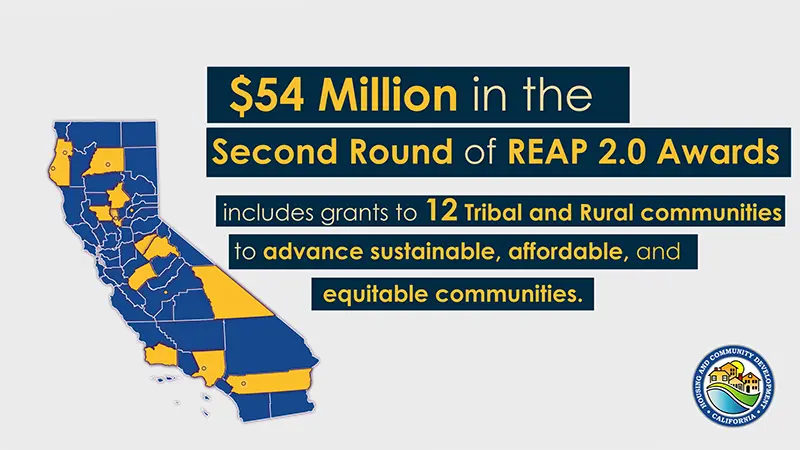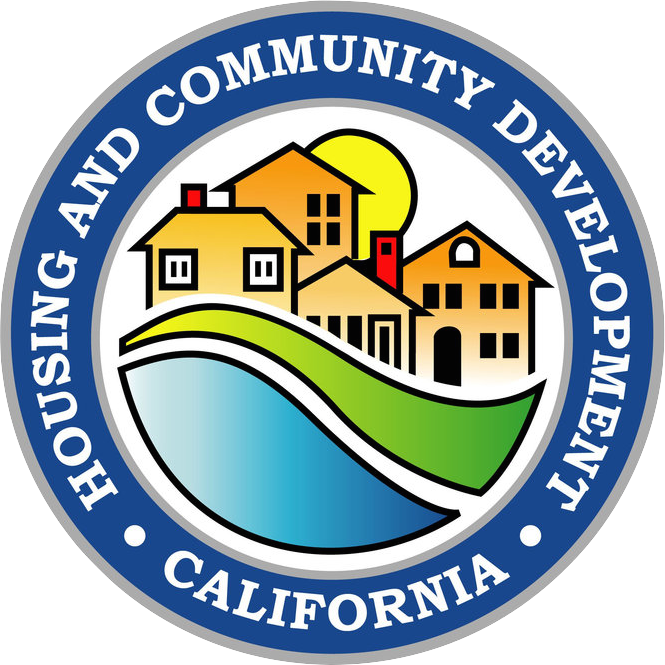California to Support the Acceleration of Affordable Housing and Climate-Friendly Infrastructure in Tribal and Rural Communities
$54 Million in Regional Early Action Planning Grants Include Support for 12 Tribal and Rural Communities in their fight for Climate Resiliency and Equity
October 9, 2023

Second round of REAP 2.0 awards.
Sacramento, CA
California today announced more than $54 million to support climate resilience by helping communities plan for and build more infill homes and infrastructure that support walking, rolling, biking, and transit as an alternative to driving. Today’s awards include $29 million set aside to support a dozen Tribal and Rural communities in addressing their unique planning challenges.
“California tribes and rural areas face unique challenges when making infrastructure improvements and building affordable housing,” said Business, Consumer Services and Housing Agency Secretary Lourdes Castro Ramírez. “These grants recognize that affordable housing and infrastructure conditions vary widely across tribal lands and rural areas and provide greater local control to plan and respond to local priorities and needs. The state is proud to partner with tribes and rural areas to catalyze development of climate-friendly homes and promote stronger local economies.”
Administered by the California Department of Housing and Community Development (HCD), the Regional Early Action Planning Grants of 2021 (REAP 2.0) program makes progress toward our statewide housing goal of 2.5 million new homes by 2030 with 1 million of those being for low-income residents. The work that is enabled through this funding is locally led and includes planning for infill housing, infrastructure, and community investments that increase housing supply and choice, and reduce vehicle miles travelled—all while affirmatively furthering housing equity.
The REAP 2.0 program builds partnerships with regions, tribal communities, and stakeholders by funding both planning and implementation actions that are community led and will encourage community growth that includes climate-friendly affordable housing and benefits existing residents through infrastructure while reducing toxic greenhouse gas emissions from cars.
“Too often, lack of sufficient infrastructure is a financial roadblock to building housing—particularly for tribal communities and rural areas,” said HCD Director Gustavo Velasquez. “These awards show the state’s coordinated commitment to ensuring no community is left behind because of lack of infrastructure. I am proud of the partnership we’ve built with tribal and rural communities so we can tailor our programs to meet their needs and together build more climate-smart homes and communities.”
Over $54 million in REAP 2.0 grants were awarded today to 12 Tribal and Rural communities, as well as four metropolitan planning organizations:
- Big Valley Band of Pomo Indians, $5,000,000
- Fernandeño Tataviam Band of Mission Indians, $410,000
- Hoopa Valley Housing Authority, $4,893,017
- Indian Cultural Organization & Winnemem Wintu Tribe, $2,060,042
- Soboba Band of Luiseño Indians, $2,180,000
- Wiyot Tribe, $4,998,048
- City of Nevada City, $300,000
- County of Calaveras, $1,747,972
- County of Colusa, $2,406,513
- County of Inyo, $220,000
- County of Tuolumne, $3,085,000
- Humboldt County Association of Governments, $2,699,407
- Butte County Association of Governments, $2,650,286
- Fresno Council of Governments, $13,000,000
- Merced County Association of Governments, $3,621,545
- Santa Barbara County Association of Governments, $5,255,471
The Big Valley Band of Pomo Indians will receive $5,000,000 to undertake a rancheria-wide master planning process, develop infill housing, and make utility and infrastructure improvements, including wayfinding, a pedestrian path, and a bus stop.
Fernandeño Tataviam Band of Mission Indians (FTMBI) will use its $410,000 award to develop 14 affordable homes on a transit- and amenity-rich site, setting the stage for the first Tribal Housing Development in Los Angeles. FTMBI will also provide services such as rental assistance, food, and transit passes to residents.
Hoopa Valley Housing Authority will receive $4,893,017 to develop utility, sewer, and active transportation infrastructure that will support a 35-unit affordable senior housing community in the near term, and an additional 25 units in a future phase of development.
The Indian Cultural Organization, on behalf of the Winnemem Wintu Tribe, will utilize their $2,060,042 award for Tuiimyali, their ecovillage revitalization project. These funds will go toward the construction of approximately 18 homes that would reunite all 96 members in one location and reduce annual Vehicle Miles Traveled (VMT) by an estimated 280,992 miles.
The Soboba Band of Luiseño Indians will receive $2,180,000 for the development of an infill housing project and connected multi-use paths. Program funds will go toward outreach, feasibility studies, predevelopment activities, and construction related to the development of housing units, as well as two multi-use bicycle and pedestrian paths.
The Wiyot Tribe will use its $4,998,048 award to acquire four underutilized, infill sites throughout Humboldt County to redevelop into affordable, multifamily housing projects.
The City of Nevada City will receive $300,000 to develop pre-approved residential designs that can be used to accommodate accessory dwelling units, SB 9 developments, or small primary homes that could be permitted without a discretionary review.
The County of Calaveras will receive $1,747,972 in REAP 2.0 funds to cover the cost of permit fees and utility connections for approximately 76 lower- to moderate-income homes near public transit and employment centers.
The County of Colusa will receive $2,406,513 in REAP 2.0 funds for planning and predevelopment activities, as well as infrastructure projects, that will support 48 income-restricted homes affordable to lower-income households.
The County of Inyo will use its $220,000 award for zoning and General Plan updates that will reduce land use and zoning barriers. These updates will encourage development that focuses on new growth within and near existing communities that will improve the relationship between jobs and housing while also being sensitive to environmental constraints.
The County of Tuolumne will use its $3,085,000 award for the expansion of the Jamestown Sanitary District sewer system and wastewater treatment facilities and the construction of the Valley Vista Water Storage Tank, which will support future housing developments in several of the County’s large and undeveloped parcels.
Humboldt County Association of Governments will receive $2,699,407 to fund an on-demand micro transit program and infill housing development project through partnerships with the Humboldt Transit Authority (HTA) and We Are Up (WAU) nonprofit organization, respectively. On average, the micro transit program is estimated to lower per-capita VMT along with a 28% reduction from the WAU infill development, which is expected to be 50 units.
Butte County Association of Governments will receive a $2,650,286 award to construct pedestrian and bicycle improvements in the City of Biggs; facilitate complete street improvements in a low-income area of the City of Chico; construct pedestrian and bicycle infrastructure along the Highway 99 corridor in the City of Gridley; facilitate active transportation connections between important activity centers and destinations in the downtown area of the City of Oroville; establish a Sewer Service Overlay Zone along main commercial arterials in the Town of Paradise; and fund predevelopment work for affordable multifamily housing in the Town of Magalia.
Fresno Council of Governments will suballocate the entirety of its $13,000,000 award to local jurisdictions to fund projects that accelerate infill housing development, affirmatively further fair housing, and reduce VMT.
Merced County Association of Governments will suballocate its $3,621,545 through two suballocation programs – one non-competitive RHNA-based suballocation for local jurisdictions to utilize for eligible planning activities and one competitive suballocation to be used for transformative capital improvement projects.
Santa Barbara County Association of Governments will suballocate its $5,255,471 award to the following projects: infrastructure improvements in the City of Santa Maria; a permit-ready ADU program in the City of Lompoc; construction of a prototypical single-family home utilizing 3D printing construction technology; countywide active transportation dashboard; connective, multipurpose path in the City of Goleta; pilot housing project in the City of Santa Barbara converting vacant and underutilized city-owned property to affordable housing; 100% affordable housing project in the Town of New Cuyama.
To learn more about REAP 2.0, visit the HCD website.


